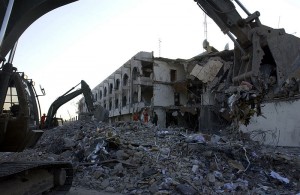NY Times details the Iraqi weapons found and destroyed
New York Times reports that Iraqi chemical weapons from the Saddam Hussein era, were bought and destroyed by the CIA. Operation Avarice, began in 2005 and continued into 2006, destroying at least 400 Borak rockets.
“Many rockets were in poor condition and some were empty or held a nonlethal liquid, the officials said. But others contained the nerve agent sarin, which analysis showed to be purer than the intelligence community had expected given the age of the stock,” the article notes.
A New York Times investigation published in October found that the military had recovered thousands of old chemical warheads and shells in Iraq and that Americans and Iraqis had been wounded by them, but the government kept much of this information secret, from the public and troops alike.
These munitions were remnants of an Iraqi special weapons program that was presumably abandoned long before the 2003 invasion, and they turned up sporadically during the American occupation in buried caches, as part of improvised bombs or on black markets.
“Without speaking to any specific programs, it is fair to say that together with our coalition partners in Iraq, the U.S. military worked diligently to find and remove weapons that could be used against our troops and the Iraqi people,” Rear Adm. John Kirby, the Pentagon press secretary, said in a written statement.
Retired Army Lt. Gen. Richard P. Zahner, the top American military intelligence officer in Iraq in 2005 and 2006, said he did not know of any other intelligence program as successful in reducing the chemical weapons that remained in Iraq after the American-led invasion.
Much of these details are coming to light due to the soldiers’ exposure to the dangerous gases.
Aaron Stein, an associate fellow at the Royal United Services Institute, said the belated acknowledgment of a chemical-rocket purchases, as well as the potentially worrisome laboratory analysis of the related sarin samples, raised questions about the military’s commitment to the well-being of those it sent to war.
“If we were aware of these compounds, and as it became clear over the course of the war that our troops had been exposed to them, why wasn’t more done to protect the guys on the ground?” he said. “It speaks to the broader failure.”















